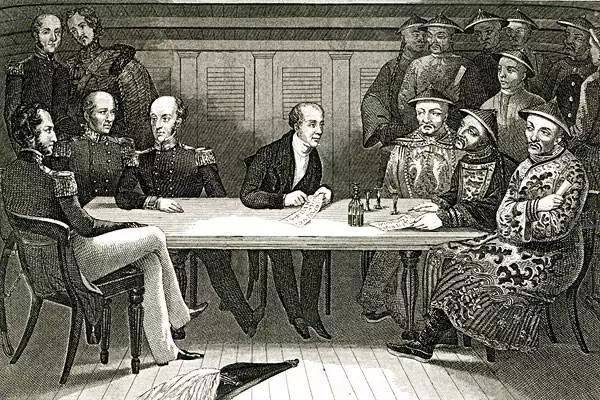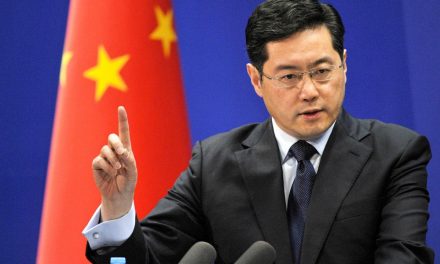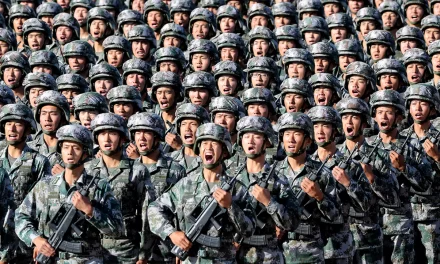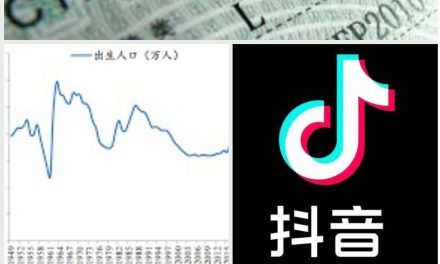Editor’s note: This brief essay was submitted anonymously. “Bai Ding” is a longstanding Chinese name meant to represent a common person of no particular distinction.
Children who were born and raised in the People’s Republic of China (“China” here refers exclusively to this entity) have been exposed to the century-old history of humiliation of China’s oppression by Western powers. The children also learn that since October 1, 1949, the Chinese people have arisen. What makes today’s children even more proud is that China has not only become the world’s second largest economic power from the sick man of East Asia of the past, but that it is also within sight of surpassing the United States.
Echoing the above-mentioned education and resultant mindset is the most familiar and favorite quotation among Chinese children: if you are behind, you will be thrashed. This has become the unanimous reason given by all young people when they express their hope for a strong China. However, this narrative has given rise to two absurd paradoxes.
First, throughout Chinese history almost all dynastic changes were the result of relatively backward foreign enemies invading and replacing the powerful previous dynasties. It can be seen that even if past dynasties became less backward in their final years, they could not escape the doom of being overthrown.
Looking at China’s 70-year history, one obtains a new understanding of the plausibility “If you are behind, you will be thrashed.” From 1949 to 2023, China has been besieged by the world three times, but none of them have anything to do with its backwardness.
The first besiegement occurred in the 1950s. The cause was not China’s extreme poverty at the beginning of the founding of the country, but rather that China joined hands with North Korea to invade the Republic of Korea (South Korea), an independent country recognized by the United Nations. In response to Chinese and North Korean military aggression against South Korea, the United Nations authorized the military forces of 16 countries and the medical forces of 5 to form the United Nations Army to provide the Republic of Korea with the military and military resources necessary to repel the Chinese and North Korean armed attack and restore peace to the Korean Peninsula. This was the first time that China had been placed under siege by the world, and it was a military blow. After that, China was an isolated island that was embargoed by the free world for more than 20 years. This embargo did not begin to be gradually lifted until the establishment of diplomatic relations between China and the United States in the late 1970s.
China’s second besiegement occurred in 1989, 10 years after the embargo was lifted. This time it was an economic siege. At that time, China had entered the second decade of reform and opening up, economic vitality was beginning to appear, and its national strength soon far exceeded that in any period durimg the previous 40 years. The second time the world besieged China was not because of China’s backwardness, but because the CCP regime used the army to massacre peaceful protesting students and citizens on Tiananmen Square and Chang’an Avenue in the early morning of June 4 of that year. This incident is called “June 4th Tiananmen Massacre” overseas, but it is merely called the “June 4th Incident” in China. After this “incident,” many developed countries cut off economic ties and aid to China. These economic sanctions lasted for many years and were not completely lifted until the eve of China’s accession to the WTO in November 2001.
The third time China was besieged by the world began in 2019, after China’s per capita GDP had reached 10,000 US dollars, bid farewell to poverty, entered the ranks of the world’s middle-income countries, and became the world’s second largest economy. The present Chinese regime is stronger than at any time in its history. The thrashing this time was obviously not administered because of China’s backwardness.
Upon joining the WTO, China achieved unprecedented economic momentum. On the eve of the outbreak of the Wuhan pneumonia epidemic, China had become the world’s processing plant, and had been the engine of the world economy after the 2008 global financial crisis. No country was willing to miss out on the opportunities brought by the huge Chinese market, and more international participation was going to further accelerate China’s economic development.
This was a win-win situation for China and the world. However, China mistakenly regarded this development as an economic resource that could be unilaterally controlled, and a political weapon to threaten the world. In terms of intellectual-property rights, China started from forcing foreign-funded enterprises to transfer technology, and escalated step by step to directly stealing technology in the countries of the technology’s origin. In international trade, it willfully violates international norms and freely imposes trade penalties on trading partners. In terms of international exchange more broadly, it forces countries and institutions to accept various political red lines it sets. In terms of human rights, it arbitrarily deprives people in Hong Kong, Xinjiang, Tibet and other parts of China of their civil liberties and even their lives. It provokes territorial disputes against its neighbors and resorts to force. China uses its huge market as bait to demand that the world bow down to it in all the above fields, and only with obedience is there market access.
But to the surprise of the Chinese government, the allure of the Chinese market began to fade, and the world began to show its disgust of and resistance to China. Three key events contributed to this unexpected shift: the Hong Kong protests in 2019, the global outbreak of the Wuhan pneumonia epidemic in 2020, and the 2021 widespread disclosure or CCP genocide against Uyghurs in Xinjiang. These incidents respectively represent the Chinese government’s affront to the free world on three dimensions simultaneously: a betrayal of international commitments, a threat to the global economy, and a violator of human rights. Since China entered the WTO, dissatisfaction has accumulated around the world for nearly 20 years, and finally erupted in 2019 and spread rapidly.
This sudden change is clearly revealed in the frequently issued, harshly critical statements by the Chinese government. Economic disputes between China and its trading partners have become increasingly frequent, and the relationship between the Chinese government and many countries has sharply deteriorated. In the past the world, which could not fight back against a China smiling toward it, suddenly began to demand justice from the Chinese government and even publicly condemned it. Although the Chinese government puts all the responsibility for the conflict on one side of the world, when a large number of countries and institutions clash with China at the same time and for the same reason, it is no longer clear who is really responsible.
This third time that the People’s Republic of China has been besieged by the world can be said to be a self-inflicted wound, having absolutely nothing to do with its national strength or weakness.
If we must find a basis for the thinking of “being thrashed if we lag behind” in real life, it only exists in the general mentality of the Chinese people today. Bullying not only manifests in the consistent behavioral patterns of the Chinese government listed above, it also leaves a deep imprint on ordinary people. Living in a society where the strong use their fists to make the weak bow down, the public must also feel that it is only natural for a country that has become strong to make weak countries bow down as their vassals.
This idea is implanted in children in China from an early age. In an environment lacking the enlightenment of modern civilization, this barbaric concept will accompany and guide them throughout their lives. China’s wolf warriors both civilian and diplomatic are the adult versions of what these children presage.
Less than a week after the International Criminal Court issued an arrest warrant for Russian President Vladimir Putin, China’s head of state and Communist Party leader Xi Jinping traveled to Moscow to form a new alliance with him.
What will China, which has yet to emerge out of the third besiegement by the world, face next? The answer may have already been marked on the scroll of history.
(This piece was translated from Yibao Chinese. If republished, please be sure to add the source and link before the text when reprinting: https://www.yibao.net/2023/04/10/the-present-and-future-of-a-china-besieged-at-chinas-initiative-by-the-world/
The views of the author do not necessarily represent those of this journal.
























